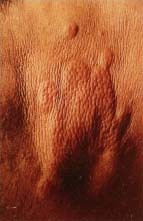Hives
Hives are itchy wheals (welts) that erupt on the skin, usually caused by an allergic reaction.
KEYWORD
for searching the Internet and other reference sources
Allergy
What Are Hives?
Hives, also known as urticaria (ur-ti-KARE-e-a), develop as a reaction to various stimuli. Certain foods, food additives or dyes, drugs, alcohol, or viral infections can cause hives in susceptible people. Foods that commonly cause hives include milk, eggs, shellfish, strawberries, other fruits, and nuts.
Penicillin and aspirin cause hives in some people. Some viral infections that are known to cause hives are hepatitis (inflammation of the liver), infectious mononucleosis, and rubella (German measles).
Some people develop hives after vigorous exercise that causes them to sweat. Sometimes the sun or cold air can cause hives to appear on people's skin. In some people, diving into cold water can result in severe hives—in a condition known as cold urticaria.
Signs and Symptoms
The first symptom of hives is itching, after which the wheals appear. Wheals usually are small, white welts with red, inflamed areas surrounding them; in some cases, however, they can be quite large. They usually erupt on the arms, legs, and trunk. Sometimes they develop into a ring, with the center clearing before the outer ring improves. Hives tend to come and go on different areas of the skin, and individual welts can last several hours.

What Is Angioedema?
A more severe form of hives, called angioedema (an-jee-o-e-DEE-ma), can cause swelling of the hands, feet, eyelids, lips, genital area, and airway passages, making breathing difficult. In some cases, angioedema is a hereditary disorder, and a family history usually is present. In these cases, it is a chronic condition, which means that it recurs from time to time.
Treatment for Hives
Most cases of hives clear up by themselves in 1 to 7 days. Some cases respond to medications such as antihistamines (an-tee-HISS-ta-meens) or corti-costeroids (kor-ti-ko-STER-oids). Antihistamines are used to combat the allergic reaction, and corticosteroids are used to fight the inflammation.
See also
Allergies
Skin Conditions
Can Hives Be Prevented?
The only way to prevent hives is to avoid a known trigger (the substance that sets off the reaction). Many people who develop hives outgrow them over time without treatment.
Comment about this article, ask questions, or add new information about this topic: